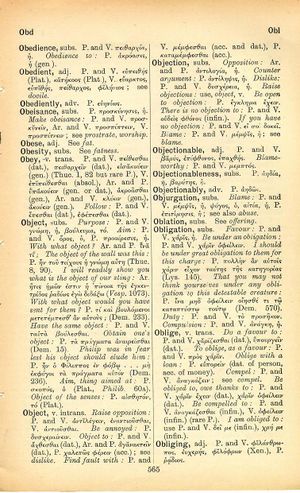objection: Difference between revisions
From LSJ
ταυτὶ γὰρ συκοφαντεῖσθαι τὸν Ἕκτορα ὑπὸ τοῦ Ὁμήρου → that is a false charge brought against Hector by Homer
(Woodhouse 4) |
(CSV4) |
||
| Line 1: | Line 1: | ||
{{ | {{Woodhouse1 | ||
| | |Text=[[File:woodhouse_565.jpg|thumb|link={{filepath:woodhouse_565.jpg}}]]'''subs.''' | ||
<b class="b2">Opposition</b>: Ar. and P. [[ἀντιλογία]], ἡ. | |||
<b class="b2">Counter argument</b>: P. [[ἀντίληψις]], ἡ. | |||
<b class="b2">Dislike</b> P. and V. [[δυσχέρεια]], ἡ. | |||
<b class="b2">Raise objections</b>: use, <b class="b2">object</b>, v. | |||
<b class="b2">Be open to objection</b>: P. [[ἔγκλημα]] ἔχειν. | |||
<b class="b2">There is no objection to</b>: P. and V. οὐδεὶς [[φθόνος]] (infin.). | |||
<b class="b2">If you have no objection</b>: P. and V. εἰ σοὶ δοκεῖ. | |||
<b class="b2">Blame</b>: P. and V. [[μέμψις]], ἡ; see [[blame]]. | |||
}} | }} | ||
Revision as of 09:48, 21 July 2017
English > Greek (Woodhouse)
subs.
Opposition: Ar. and P. ἀντιλογία, ἡ. Counter argument: P. ἀντίληψις, ἡ. Dislike P. and V. δυσχέρεια, ἡ. Raise objections: use, object, v. Be open to objection: P. ἔγκλημα ἔχειν. There is no objection to: P. and V. οὐδεὶς φθόνος (infin.). If you have no objection: P. and V. εἰ σοὶ δοκεῖ. Blame: P. and V. μέμψις, ἡ; see blame.

